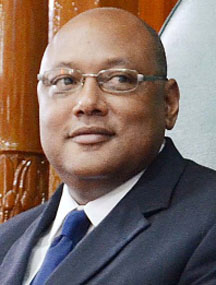The APNU+AFC government is moving to reactivate the Integrity Commission, according to Minister of Governance Raphael Trotman who said PNCR executive and former Chief Whip of that party Lance Carberry has been tasked with the responsibility to move this process forward.
“As for the Integrity Commission, Mr. E. Lance Carberry is to commence a review this week and provide a report for its reactivation which will come shortly thereafter,” Trotman said yesterday when Stabroek News asked him about the issue.

For years the commission has been a controversial issue as even though the past PPP/C administration had sworn-in members in 1999 its work was curtailed after the Chairman, Bishop Randolph George resigned in 2006. The Secretariat of the Commission has in the past placed notices calling on those public officials coming under its jurisdiction to submit returns. Shortly after the 2011 elections, then Prime Minister Sam Hinds had said the Donald Ramotar administration would have shortly sworn-in new members of the commission but this was never done.
While in opposition APNU and the AFC had stressed the need for such a commission and when they formed a coalition in February this year they had stressed that once they were voted in the commission would have been reactivated with urgency.
According to the coalition’s manifesto they would appoint an independent Integrity Commission as a matter of urgency, staffed by persons of the highest integrity.
In its February 26, 2015 column in this newspaper, APNU had further said that should the alliance win the elections its ministers would be required to declare their income and assets to a functioning Integrity Commission. “Bribes, graft and kickbacks will not be tolerated. Public funds will be used only for the benefit of Guyanese citizens, instead of to enrich politicians, their families and their friends,” the party had written.
The PPP/C government and the then opposition had previously clashed over the issue after then-President Bharrat Jagdeo issued an ultimatum to MPs in 2009 to submit their declarations of assets and liabilities to the Integrity Commission or face criminal charges. The opposition parties, however, had questioned the validity of the commission and called for it to be reconstituted. Jagdeo had subsequently announced that consultations would start towards resuscitating the commission.
Bishop George had tendered his resignation during the early part of 2006. Since then no new member has been added to the commission or a chairman elected to replace him. He was initially appointed a member of the commission by the late former President Janet Jagan and was subsequently re-appointed by Jagdeo.
The other commissioners at the time were are President of the Central Islamic Organisation of Guyana, Fazeel Ferouz; Secretary of the Guyana Council of Churches, Nigel Hazel; and Director of the National Commission for Family, Pandit Rabindranauth Persaud. The commission’s life has since ended.
The commission came into being as a result of the Integrity Commission Act, 1997; Act No 20 and was assented to by then President Samuel Hinds. The first set of commissioners was appointed in 1999.
The re-appointment of the commissioners was a cause for concern to then Leader of the Opposition Robert Corbin who took legal action in May 2005 to nullify the appointment of the Chairman and members of the commission, arguing that the President did not consult him, and that the appointments were made arbitrarily and unconstitutionally as they were in breach of the constitutional provision that provides for the leader of the opposition “to express a considered opinion on the appointment of the Chairman and members of the Integrity Commission.”
Following the resignation of Bishop George, Dr James Rose had been nominated by the government to be chairman but he subsequently withdrew his name after the opposition parties raised concerns.
In his accountability column in today’s Stabroek News, former Auditor General Anand Goolsarran raised the need for the functioning of the commission.
He said “While highly desirable and urgently needed, the code of conduct (for public officials) has to be supported by a fully functioning and effective Integrity Commission. Surprisingly, the 100-day action plan has not addressed the fact that since 2006 when Bishop George resigned as Chairman of the Commission, there has been no sitting of the Commission since then. Compliance has also been uneven in terms of filing of annual returns of income as well as assets and liabilities.
Both the Inter-American Convention against Cor-ruption (IACAC) and United Nations Conven-tion against Corruption (UNCAC), to which Guyana is a signatory, emphasise the importance of having strong and effective mechanisms in place for not only such annual declarations and scrutiny thereof but also in relation to public procurement. “
In a column in the August 27, 2013 edition of Stabroek News, the Transparency Institute Guyana Inc had said that since its enactment in 1997, “the Act has not been realized because of the half-hearted approach that has been taken to establish, resource and ensure the integrity of the Commission itself. Despite the fact that President Ramotar publically stated that “corruption is a problem” in Guyana, he has not advanced any significant effort to tackle corruption.
It noted that according to the Act, unacceptable conduct includes: taking bribes or favours; engaging in discriminatory practices; receiving gifts for reward for services; conflict of interest; using documents or information for personal benefit; using public property for private use; engaging in sexual misconduct; and giving private interest a higher priority than public duty.
It pointed out that the Act requires that by June 30th every year, public officials are required to declare how much money they make and their assets as well as those of their spouses and children. All gifts received by public officials abroad are to be vetted by the Integrity Commission to determine whether those gifts are personal, or whether they are the result of corrupt activities.




